- Home
- Shelby Foote
Love in a Dry Season
Love in a Dry Season Read online
SHELBY FOOTE
Love in a Dry Season
Shelby Foote came from a long line of Mississippians. He was born in Greenville, Mississippi, and attended school there until he entered the University of North Carolina. During World War II he served in the European theater as a captain of field artillery. He wrote six novels: Tournament, Follow Me Down, Love in a Dry Season, Shiloh, Jordan County, and September September. He was awarded three Guggenheim fellowships during the course of writing his monumental three-volume history, The Civil War: A Narrative. He died in 2005.
ALSO BY
SHELBY FOOTE
Tournament
Follow Me Down
Shiloh
Jordan County
September September
The Civil War. A Narrative
VOLUME I. Fort Sumter to Perryville
VOLUME II. Fredericksburg to Meridian
VOLUME III. Red River to Appomattox
First Vintage Books Edition, June 1992
Copyright © 1951 by Shelby Foote
Copyright renewed 1979 by Shelby Foote
All rights reserved under International and Pan-American
Copyright Conventions. Published in the United States by
Vintage Books, a division of Random House, Inc., New York,
and distributed in Canada by Random House of Canada Limited, Toronto.
Originally published in hardcover by The Dial Press, New York, in 1951.
Lyrics from the Jelly Roll Morton songs “Don’t Leave Me Here” and
“Mamie’s Blues,” copyright by Tempo-Music Publishing Company,
Washington, D.C., and used with their permission.
Lyrics from the song “Empty Bed Blues,” by J. C. Johnson,
copyright 1928 and 1947 by J. C. Johnson,
and used with his permission.
Library of Congress Cataloging-in-Publication Data
Foote, Shelby.
Love in a dry season / Shelby Foote. / 1st Vintage Books ed.
p. cm.
eISBN: 978-0-307-77925-0
I. Title.
PS3511.0348L68 1992
813′.54—dc20 91-50722
v3.1
CONTENTS
Cover
About the Author
Other Books by This Author
Title Page
Copyright
ONE:
1. The Barcrofts
2. Jeff and Amy
3. Harley Drew
TWO:
4. Citizen Bachelor
5. Another Courtship
6. A Renouncement
THREE:
7. Death of a Soldier
8. Shots in the Dark
9. Miss Amanda
ONE
1. The Barcrofts
Major Malcolm Barcroft was sixty-seven when he died, the last male of his line. Accompanied as it was by word of his daughter’s peculiar reaction, the announcement of his death caused people to remember many things about his life which they otherwise might have forgotten, as is usually the way in the formality of getting a man of property buried and awaiting the reading of his will. He was an institution in Bristol, one of the final representatives of what the town had progressed beyond. Winter and summer he wore dark suits and pleated-bosom shirts with a pearl stud and plain gold cuff links and a snub bow tie. When he stood alone or walked about for his evening constitutional he gave an impression of height and stiffness—‘high-stomached,’ Negroes called him; but when he was juxtaposed among other men you saw that he was not really tall and that his shoulders were even a bit stooped. He wore a rimless pince-nez from which a length of fine chain dropped like a golden cobweb to a spring button at his left lapel. His mustache and roached hair were iron-gray, and his nose was like a blade between flat cheeks, sallow from recurrent malaria, and burning brown eyes. Lightly grizzled, his eyebrows were tufted at their outer ends, giving him a somewhat Mephistophelian air. This was belied, however, by a soft voice and a courteous old-world manner.
He was born in Reconstruction times, 1873, two months after his father, who had been a Confederate officer and had come home one-armed from the war, was killed in a scuffle over a ballot box with one of Governor Ames’ imported election officials. Reared by his mother and a maiden aunt, Malcolm was wilful and impetuous and domineering, until the two women, taking the advice of an uncle, gave it up and packed him off to military school in Tennessee. There he found interests worth his talents, studies of campaigns more complex than those involved in outwitting two admiring but rather terrified female relations, and he settled down with unexpected seriousness. He was impatient during vacations at home, reading military biographies, Jomini and Badeau, for which he drew sketchmaps to follow the battles and entered his objections in the margins, usually with exclamation points and cross-references to sustain him. He cultivated the habit of saying, “Good, good,” as Stonewall Jackson was said to have done, and of raising one hand palm forward from time to time, also as Jackson was said to have done—to implore divine guidance, according to some, or merely to slow the flow of blood and thereby ease the throb of the wound he had taken at First Manassas, according to others. Malcolm took all this quite seriously, and if it sometimes had its ridiculous aspect, he at least was never conscious of it.
In his final year at the Tennessee school he was appointed cadet captain and had decided definitely on an Army career. His life seemed to stretch out before him in agreeable vistas, brilliant forays on the frontier, punctuated with periods of tedious but glittering staff duty in Washington, and perhaps—if the Germans and Spaniards continued to bluster—a real war to lodge his name in the history books, or at least in the tactics manuals. To these last he brought an enthusiasm and appreciation which some young men his age were devoting to Keats. He found them exciting, and not only for their subject matter—the language itself enchanted him. The mission of the infantry in attack, as defined by the text: “to close with the enemy and destroy him,” had a wild, triumphant, almost lyric beauty, while the mission of the infantry in defense: “to maintain the integrity of the position,” was nothing less than the finest phrase in literature. His scalp would tingle when he read such things; the hair on his neck would bristle.
But just three weeks before commencement exercises he received a letter in which the family stationery was puckered with little blisters where his mother’s tears had dried. The gentleman left in charge of his father’s estate—a lawyer, a friend of the family—had absconded (“gone to Texas,” the letter said) with what little was left after hopeful but feverish mismanagement. So when the final dress parade was over Cadet Captain Barcroft packed his trunk, folding in the gaudy uniforms with the unblooded sword and the paper-backed texts, of which no future edition would bear his name, and came home to Bristol to enter his bachelor uncle’s cotton office. He renounced the dream of pomp and glory, the study of evolutions of the line and the finer points of precedence, and undertook the study of staple values and fluctuations in the cotton market.
Within three years he had learned the business well enough to permit his uncle to relax, and within another three years the uncle retired. If Malcolm’s income was not sufficient to make him the catch of the town, at least his family background and his earnest manner after his mother’s misfortune made people consider it hardly more than he deserved when he became engaged to the only daughter of a wealthy retired planter. After a wedding still remembered in the Delta for the tubs of champagne punch and the fine gowns of the bride and bridesmaids, Mr and Mrs Barcroft sailed from New Orleans on a Mediterranean tour. Halfway up the Italian boot they were recalled by the death of the father-in-law, and a year later, when the legal smoke had cleared, the young husband found himself in possessi
on of just under half a million dollars in good securities and his wife had borne him a child.
They named her Florence, for that was the city they had most looked forward to visiting; they were in a coach on the way there, reading of Florentine splendor and intrigue in their red-bound Murray, when the cablegram overtook them. Malcolm Barcroft now had everything he could ask for, except the very one thing he wanted most: a male heir. However, the disappointment at the child’s being a daughter was offset somewhat by the assurance—doubly welcome since his wife was far from robust—that there was no question of barrenness.
When the second child was born he was in Panama Beach, Florida, commanding a company in the Second Mississippi Volunteers, the former Mississippi Rifles who, arrayed in a V by their colonel, Jefferson Davis, had pierced the Mexican center at Buena Vista fifty years ago. His early dream of martial fame had been offered him again and he had taken it. In point of fact, however, there was little glory. The war ended before his regiment embarked, and though there were casualties in numbers large enough to compare with the bloodiest of campaigns, embalmed beef was no enemy to reflect glory on the men who fought it—no man brags of a battle when the field was his own gut. In 1899 he received his majority and was mustered out to come home to his wife and children.
This second child was a girl too; they gave her her mother’s name, Amanda. Two days after the major arrived the doctor took him aside. “This birth was even harder than the first,” he said, an old man who retained a diffident, apologetic manner despite forty years spent attending the ills of half the county. “I dont advise that Mrs Barcroft bear another child.”
Less than a year later the third was born. Major Barcroft walked the corridor for two days, back and forth, passing and repassing the door of the room where his wife lay wailing and whimpering. On the second night, however, the wailing stopped; it stopped quite suddenly, and the nurse came out and told him she was dead. The major glared at her. “Did you save the child?”
“It’s a son,” she said.
That was when his eyes first misted with tears: he had waited for this—so that they appeared to be not so much tears of grieving as of triumph. For a moment he considered calling the boy Hezekiah; that was the name of the dead father-in-law. Then he put the thought aside; it had been a notion of his wife’s, who had always been a bit off her mind in the final stages of pregnancy anyhow. He called him Malcolm, the name of the firstborn male Barcroft for five generations now. And they lived, the four of them, father and daughters and baby son, in the big gray house which the father-in-law had built five years ago for his daughter to move into when she and her husband returned from the grand-tour honeymoon. It was in the fashionable part of town, with four large oaks across the front. Angular, wooden, Neovictorian, it loomed among clapboard cottages and two-story stucco ‘mansions,’ dwarfing them. Gingerbread trim, tacked to the eaves and mansard windows, gave the house an incongruous aspect, at once lightsome and clumsy, like an elephant dancing.
Major Barcroft left the girls to the care of their nurse, but himself undertook the raising of his son. The boy resembled his mother, with parchment-colored skin, soft violet eyes, and a head too large for his body. In time he developed a finicky, effeminate manner—a bit of shell in his soft-boiled egg at breakfast would upset his stomach for the balance of the day. Better than anything he liked to be alone in a far corner with a pair of his dead mother’s scissors, clipping the bright flimsy illustrations from magazines. He was nervous and excitable; if anyone spoke to him harshly he became ill. On his sixth birthday the major gave him a Shetland pony, but he was afraid of it. When his father tried to persuade him to sit in the saddle he began to back away, and when the major finally lost patience and lifted him to place him on the pony’s back, he kicked and screamed and then began to vomit and had to be put to bed.
After this Major Barcroft tried other ways. He bought a crate of lead soldiers, miniature warriors done to scale, each with its musket or saber. There were all the accompanying impedimenta of armies, cannons and wagons with horses to draw them, headquarters tents, ambulances, and field kitchens. He had the crate taken into the parlor and unpacked it there, not caring how much excelsior cluttered the carpet and furniture as he lifted out the figures one at a time. “See this one? He’s a general. Look at his stars.” When he had unpacked them all, he arrayed them for a grand review, then turned to Malcolm and said earnestly, “Thats your army, son. What do you think of it?”
“It’s nice, papa.”
“Nice—” Major Barcroft looked at him. Malcolm was not nearly as enthusiastic as his father had expected him to be. “Wait,” he said, turning back to the soldiers; “I’ll show you how to play with them.”
He built two opposing ridges with sofa pillows and chalked a wavering line on the carpet between them. “Thats the Rappahannock. This is the town of Fredericksburg, on this side. Those hills over there are Stafford Heights and they belong to Burnside.” He dropped to his knees, arranging the soldiers and cannons so that they faced each other across the little valley. “These hills on this side the river are Marye’s Heights. They belong to General Lee—this is the hill where he stood and watched the battle. ‘It is well that war is so terrible; we should grow too fond of it.’ He said that standing on this little hill. All right. Longstreet was up there and Stonewall Jackson down here. Your grandpapa was with General Barksdale in the town, shooting to keep old Burnside’s men from crossing on their pontoons.”
The major went on with it, scrambling about on hands and knees, moving the soldiers. He demonstrated Pelham’s gallant resistance with two of the miniature fieldpieces and became highly excited as he staged the Federal advances, leaving windrows of slain lead soldiers behind on every charge. Then, as he moved the survivors forward for their third assault against Longstreet’s sunken road, reproducing the deep, throaty roar of the Yank attackers and the high, fanatic scream of the Rebel defenders, he turned to say something to Malcolm. He had become so absorbed in the tactics of Fredericksburg, shifting the troops, emplacing the artillery, he had almost forgotten that the demonstration was intended for his son.
At first he did not see him. Then he caught sight of the boy behind a chair. Malcolm had not even followed the battle; he had taken two of the horses from General Pendleton’s artillery park and was concentrating on making them lope around a chair leg in a decidedly unmilitary manner. The major rose, brushing the knees of his trousers and shaking his head, and left the room without saying anything further. He was too angry to trust himself to speak.
For the next five years Major Barcroft divided his time between his cotton office and his son, doing all he could to change the boy from what he was to what he, the major, wanted him to be. And he had some success. He got him onto the pony, for one thing: taught him to ride with his legs straight, dragoon style, without posting—Malcolm even became fond of it. Though the major was discouraged to see that he treated the animal more like a pet kitten than a horse, it gave him real satisfaction to see his son’s large head jogging steadily above his narrow shoulders as he rode the streets of Bristol on the round-barreled little stiff-kneed Shetland pony.
On Malcolm’s eleventh birthday his father gave him a case of shells and a 410-gauge shotgun, a fine hammerless model, a Parker, with a chased design of partridges and ducks at the breech and his name embossed on a silver plate set into the cut-down stock. The major took him onto the levee south of town and taught him to shoot, setting up bottles and cans and paper cartons for targets. At first he was gun-shy, flinching at the prospect of the kick; but soon he began to get over it, and at length, within a month of the day he first fired the gun, he began to put an occasional pellet into the target.
It was summer, and the major encouraged him to take the gun into the fields by himself. Sometimes Malcolm and the boy next door would go together, taking turns setting up targets and shooting. One morning in July they set out together, and two hours later the other boy came running back. He was crying, an
d at first they could not get him to tell what had happened. Then, between sobs, he told them. They found the gun where he had dropped it as he ran, and fifteen yards away, lying across the barbed wire fence on which he had been hanging the target, they found Major Barcroft’s son with the back of his big head blown off.
Florence and Amanda—Miss Flaunts and Miss Manda, their nurse called them—did not go to the public school; they went to St Mercedes Academy, the parochial school at the Catholic convent, where the teachers were called Sister, never Maam. Other Protestant children were there, most of them from the same neighborhood, for the public school was not considered ‘nice.’ The years progressed like floats at carnival, a succession of bright hair ribbons and crisp dresses worn with ribbed stockings and button-top shoes. Florence was called “the pretty one” and Amanda was called “the smart one,” though both adjectives were applied in a sense comparative strictly between the two of them. Less politely, but by the same token, Florence might have been known as ‘the slow one’ and Amanda as ‘the plain one.’ This last, however, was never done, and indeed there was little unpleasantness in their lives beyond the rough cloth their nurse used when she scrubbed their knees and elbows for Sunday school, the calomel which the doctor measured on his knife blade, and the occasional small pink bottles of medicine that he left when the sisters fell victim to grippe or whooping cough or chicken pox—for they were subject to all the ills of childhood. One terrible week they had mumps, and that was the worst.
Malcolm’s death came at a time when they were just beginning to be invited to ice cream parties. It frightened them. After the funeral they lay side by side in Florence’s big tester bed, rigid with the same unspoken memory of how their brother had looked in his gray casket set on trestles in the parlor, the way his hands had been crossed on his breast to show his clean fingernails bitten neatly to the quick, the thumbs like little clubs because he had sucked them. He might have been just lying there, about to sit up and speak, except that the smile was not like Malcolm’s smile at all and the man had propped his head unnaturally on the pillow to hide where he was hurt.

 Chickamauga and Other Civil War Stories
Chickamauga and Other Civil War Stories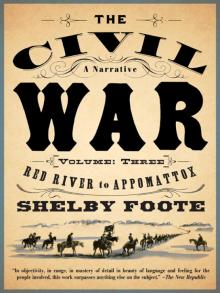 The Civil War: A Narrative: Volume 3: Red River to Appomattox
The Civil War: A Narrative: Volume 3: Red River to Appomattox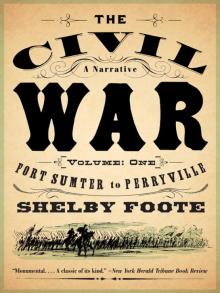 The Civil War: A Narrative: Volume 1: Fort Sumter to Perryville
The Civil War: A Narrative: Volume 1: Fort Sumter to Perryville Jordan County
Jordan County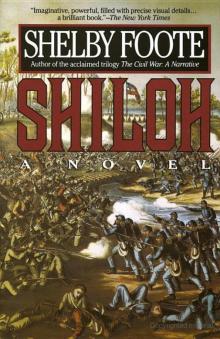 Shiloh
Shiloh Love in a Dry Season
Love in a Dry Season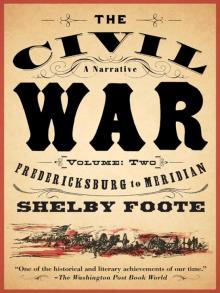 The Civil War: A Narrative: Volume 2: Fredericksburg to Meridian
The Civil War: A Narrative: Volume 2: Fredericksburg to Meridian Chickamauga
Chickamauga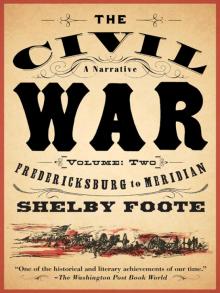 The Civil War: A Narrative: Fredericksburg to Meridian
The Civil War: A Narrative: Fredericksburg to Meridian